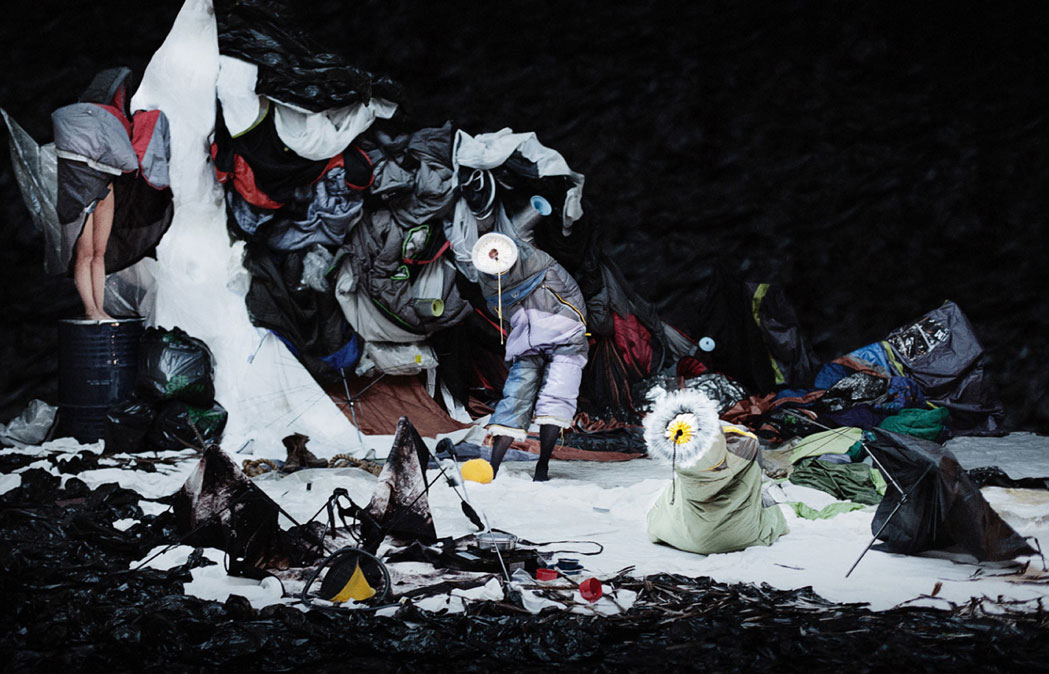Sleeping Bag Metamorphosis
Andrea Carr’s eco-scenography adventure:
How discarded camping equipment from UK’s Reading Festival was given new life.
Ethically sourcing camping equipment was high on my list for the design for STUCK by HOAX. The design, which was conceived early in the process, tells the story of ecological collapse through a subterranean wasteland landscaped from festival waste, liberating the rest of the creative team to explore other climate change narratives. STUCK is part art-installation, part absurdist theatre, and used clowning, rhetoric and soft sculpture to examine our cultural paralysis toward our changing planet. The all-female cast Ayesha Tansey and Flavia Bertram of HOAX, joined by Sabrina Manac’h, tackled themes of fertility, access to food, ingesting plastic and displaced memory in comic-tragic attempts at survival. The design contributed to the conceptual development, show’s profile and eco-credentials. With the rise of non-violent eco-activism such as Extinction Rebellion and ‘Birth Strike’, STUCK continues to gain relevance as a courageous and prescient piece of work. The design presented a symbiotic relationship between body and environment. The costumes, envisaged as a series of dramaturgical revelations, morphed from unique survival clothing into ambiguous unsettling early life forms that are, in the final instance, consumed by the set. In sourcing materials I contacted Julie’s Bicycle, who put me in touch with Reading Festival organisers, Festival Republic, and the volunteers’ cleanup. Nothing, however could have prepared me for what I saw as I stood looking over a sea of abandoned tents. By the time our four-hour slot was up the light was fading, squelching through muddy detritus, we retrieved over forty sleeping bags and nine tents. Other camping equipment included a fluorescent green camping chair seat cover, which was to find new life as a ‘romper’ suit. Cheaper camping equipment was cited as one of main causes behind the epidemic of festival waste changing it from a ‘one time’ purchase to a set of throw away items. UK festivals produce over 23,500 tons of waste per year. In 2015 Reading Festival in partnership with Julie’s Bicycle pioneered a new project to tackle campsite waste offering a tent cleaning service and options to camp in green only fields. In 2018, over 70 festival organisers joined Festival Vision 2025 at The Showman’s Show pledging to cut the environmental impacts of their events by 50%. Encouraging statistics. However, in the context of a Climate Change Emergency, Extinction Rebellion Reading have stated that greater immediate radical action is required, and will be targeting Reading Festival aiming for a clean campsite at festival end. After collecting the festival equipment it was washed and ready for re-purposing four days later. I believe that nothing gives a deeper appreciation of the resources that go into the production of an item than mindfully deconstructing it. One sleeping bag is made from synthetic textiles assembled from three layers – outer shell, padding and lining – with a life expectancy of 200 years. There is immense personal satisfaction to be gained by re-imagining its new life. Eco-initiatives do take longer than direct purchases or making from scratch. And this calls for a re-evaluation of how budgets are distributed and labour, time and expertise is valued. In this instance, van hire, fuel and eco-laundry liquid was a modest £56.00, however the true cost of labour was high. In 2016, to kick start conversations around the issues of sustainability and repurposing, Tanja Beer, Alice Hoult and I co-founded Ecostage Pledge, launched in December at ArtCOP21, Paris. HOAX performed an except from STUCK at Omnibus Perception Festival – Voice INTERROBANG, hosted by Vanessa Hammick and opened by Vivienne Westwood. As Vivienne snapped a picture of my costume, I did wonder whether it might inspire her next collection! HOAX has toured regionally and internationally appearing at ONCA in Brighton Future Fictions Symposium, where I held an Eco-Scenography in Action workshop. I have since shared my eco-scenography adventures speaking at: A Greener Festival, Serious Circus Symposium, PQ19 (The Prague Quadrennial of Performance Design and Space) where I hosted a round table discussion ‘Role of Theatre Designer for our Times’ with SBTD. I was very moved by the interest from younger people in sustainable design, and this has prompted me to connect with collegues. It is evident that theatre needs to consider its place within the context of the climate crisis. Many companies of all sizes, whether driven by new legislation, personal or global concerns are embracing the potential of ecoscenography. Many are recognising that re-cycling and re-purposing can no longer be the remit of ‘poor’ small scale productions driven by thrift rather than ethics. Never was the time more ripe to accentuate these opportunities and embrace its possibilities. As theatre makers and artists we are at the cutting edge of influencing culture and inspiring change. Festival trash is a designer’s treasure.



